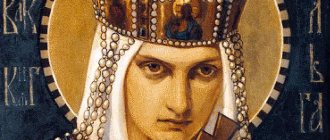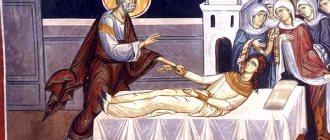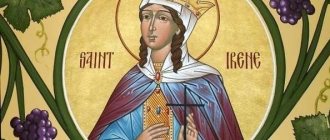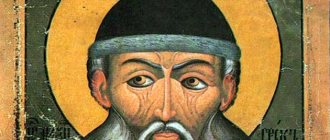The Orthodox Church remembers the Christian holy martyr Aquilina, in the Slavic interpretation as Saint Akulina, on April 20 (April 7, Julian style) on Akulina Day. In Rus', this holiday has many names - Akulina buckwheat, Akulina mosquito, Akulina day. On April 20, Aquilena begins as the patroness of sowing buckwheat crops. Saint Akulina is known in many Greek monthly books. The life of the martyr was translated into Slavic in the twelfth century. In Russia, Saint Akulina became known to believers at the end of the fourteenth century.
Aquilina preached Christianity since childhood
The Holy Martyr Aquilina the Elder was born in the city of Byblos. It was a Phoenician city, now Libya. She lived when the bloody Emperor Diocletian ruled (284-305).
Aquilina was born at the end of the 3rd century in the family of the noble lord Eutholmius. Her parents are devout Christians. From early childhood they instilled in their daughters a love for Christ. Aquilina was baptized as an infant, and her father died at the age of two. She remained with her mother without the protection of a noble family.
Emperor Diocletian. In 303 he obliged Christians to worship pagan gods. He deprived Christians of their civil rights. Saint Aquilina lived in his time.
From an early age, Aquilina rejected idolatry. She prayed a lot, revered and passionately loved Christ.
At the age of 12, Aquilina preached Christianity among her peers. She told her friends about how Jesus Christ gave his life for human sins and then miraculously rose again. That the Kingdom of Heaven awaits all who believe in the Savior and live righteously.
12 years
At this age, Aquilina preached Christianity
Holy Martyr Aquilina - Memorial Day 26.06 N.S. (13.06 old style)
[td]| Martyr Aquilina |
The holy martyr Aquilina
suffered during the reign of Emperor Diocletian (284-305). She was born in 281 in the Phoenician city of Byblos. Aquilina's parents were Christians. Four months after birth, the mother brought the child to Bishop Euphaly, who performed a catechumen on her, and when Aquilina was six months old, Bishop Euphaly baptized her. In 283, the father of Saint Aquilina, Eutholmius, died. From a young age, Saint Aquilina learned the rules of Christian piety that her mother instilled in her. Saint Aquilina passionately loved Christ the Savior and constantly prayed to Him. Her faith was so deep and ardent that she could not hide it from the pagans for long. At the age of twelve, Saint Aquilina began to preach Christian teaching among her peers. She urged them to renounce their faith in insensitive idols and believe in Christ. Saint Aquilina told the young women about the death on the cross of the Lord Jesus Christ, about His resurrection, about His salvation of fallen man. One day, a certain Nicodemus, who was a servant of the ruler of that region, Volusian, heard the sermon of Saint Aquilina. He informed Volusian about this, and he ordered the girl to be brought to him. Persuasion and threats were in vain: Saint Aquilina did not sacrifice to idols. Then they began to beat the holy youth in the face, and then, having exposed her, they scourged her. After the torture, Volusian offered Saint Aquilina a few days to think, but she refused. Then they pierced her head through the ears with hot rods. When Saint Aquilina lost consciousness, she was taken for dead and thrown outside the city to be devoured by dogs. At night, an Angel appeared to the holy martyr and healed her. He ordered her to go to Volusian and expose the insignificance of his intentions before God. Saint Aquilina thanked God for her healing and asked Him not to deprive her of her martyr’s crown. She heard a voice from above: “Go, what you ask will be fulfilled.”
| Holy Martyr Aquilina |
Guided by an Angel, Saint Aquilina went to the ruler’s palace.
The city gates themselves opened in front of her. The saint entered the ruler's chambers without hindrance and found Volusian sleeping. When he woke up and saw Saint Aquilina unharmed, he was horrified and ordered the guards to guard her until the morning. In the morning, Volusian, convinced that this was indeed the martyr Aquilina, ordered her head to be cut off as a sorceress who did not obey the royal decrees on the veneration of pagan gods. Before her execution, the holy youth prayed to God and in response heard a voice from heaven: “Come, chosen virgin, and accept the reward prepared for you.” At that same moment the saint died (+ June 13, 293). The executioner saw that she died, but, fearing the wrath of Volusian, cut off her head. Milk came out of the wound instead of blood. Christians buried the body of the holy martyr Aquilina with honor in the city of Byblos. Many sick people were healed from the tomb of the holy young woman. Later, the holy relics (or part of them) were transferred to Constantinople, where the memory of the holy martyr Aquilina began to be solemnly celebrated in the temple named after her. The last one burned down in 532, during the reign of Justinian, but was rebuilt. Troparion, tone 4:
Your Lamb, Jesus, Aquilina / calls with a great voice: / I love You, my Bridegroom / and, seeking You, I suffer, / and I am crucified, and I am buried in Your baptism, / and I suffer for Your sake, / for I reign in You, / and I die for You, and live with You; / but, as an immaculate sacrifice, accept me, who have offered myself to You with love. / Through prayers, / as you are merciful, save our souls.
Kontakion, voice 2:
Having purified your soul with kindnesses of your virginity, you rose to the heights of torment, the all-honorable Aquilino, wounded by the love of your Bridegroom Christ, who stood with the angels rejoicing: with them do not cease praying for all of us.
(Minea June. Part 1. - M., Publishing Council of the Russian Orthodox Church, 2002; www.svetigora.com).
| View from the sea of the modern city of Byblos. Lebanon. |
Aquilina argues with the city ruler
At the trial, Volusian asked her:
Are you the one who opposes the royal laws and calls on my subjects to honor the Crucified Man? Do you know that I ordered all followers of Jesus to be subjected to all kinds of torture and inevitable death? Renounce your belief in the Crucifixion, young child, so that I do not have to torture and execute you!
Aquilina replied:
If you torture my body, you will give me the crown of martyrdom, which I am really looking forward to! No amount of injury will force me to abandon my Savior! Don’t hesitate and start quickly, and you will see how strong and strong my faith is.
Volusian was taken aback by such a bold answer. He tried to convince Aquilina with affection and feigned pity:
You are so young and beautiful, child! I feel sorry for you, because your fragile body will not withstand my torture, and you will die at the very dawn of life! And your Jesus will not save you.
But Aquilina did not want to listen to anything - neither threats nor gentle speeches. She asked the tormentor to be merciless with her, so that Volusian himself could see her faith in Christ.
Folk signs for April 20
On Akulina Day, people observed nature and looked for signs of upcoming events. Thus, the rain marked a poor harvest of spring crops and raspberries. Frost in the morning was a sign of a good harvest of bread and buckwheat. • If the weather was warm and sunny outside that day, then it’s time to put pieces of fabric or items of women’s clothing on the bank of a river or other body of water to appease the awakening mermaids. • If it rained heavily on April 20, the viburnum harvest will be poor. • If the night sky on Akulina was starry, wild berries and mushrooms will soon appear. • Low-flying crows foreshadowed worsening weather. • If catkins bloomed on the aspen, then there should be plenty of peas.
Name day on April 20 on Akulina's day for Akulina, Arkady, George, Daniil, Evdokia, Peter.
Select another day of remembrance of a saint by date of birth
The city ruler orders Aquilina to be beaten
Then the bloodthirsty ruler moved from words to actions. He ordered Aquilina to be beaten in the face. And then expose her body and beat her with whips. Even after this, the girl did not give up. An enraged Volusian shouted:
Where is your God now?! If He exists, let Him come and take you away from here!
Aquilina replied:
Stupid executioner, the Lord is always with me! The more suffering I experience, the more strength and patience He gives me.
Lives of the Saints of St. Demetrius, Metropolitan of Rostov
(June 26, new style)
The suffering of the holy martyr Aquilina.
In the Palestinian city of Vivlos[1], where Christians have been appearing since the time of the Holy Apostles, lived the Christian Eutolmios, whose honest marriage the Lord blessed with the birth of a young woman; named Aquilina. Four months after the baby was born, the mother brought her to Bishop Euphaly, who announced the baby, making the sign of the cross; then, after two months, he baptized the young woman. In the second year, Aquilina lost her father, who had gone to the heavenly villages, and remained in the care of her mother; the latter raised her daughter, instilling in her the rules of a pious, Christian life; At the age of seven, the girl had already fully mastered these instructions. As she grew older, Aquilina became more and more filled with the Holy Spirit, adorned with the grace of Christ, and she was so imbued with it that in the small and still imperfect years of her youth, she courageously defeated, as an insignificant thing, the decrees of the wicked kings about idolatry obligatory for all. This is what we now have to talk about.
When Aquilina, who constantly invoked God in her prayers, was ten years old, it was the seventh year of the reign of Diocletian [2], at that time a certain Volusian, more the offspring of the devil than of man, took over the leadership of the Palestinian country. Not recognizing the true God, the Creator of all that exists, Volusian with insatiable malice began to persecute the pious followers of Christ the Savior, and many valiant warriors of Christ, who courageously endured suffering, were awarded unfading crowns. During these days, the blessed youth Aquilina, filled with the knowledge of God, often addressed her peers with the following admonition:
—What benefit does the veneration of dumb and insensitive idols bring you? Do you not know that those who worship them with faith flatter themselves with an idle, destructive, devilish hope? Are these gods dead and powerless, can they provide benefits?
- What kind of God do you worship? - Aquilina’s peers asked.
She answered:
- I worship and honor the One God worthy of worship, who created heaven, earth, sea and everything that fills them. From the beginning He does good to all who believe in Him and hope in Him and, like the Almighty, He will pour out His benefits on those who call on Him until the end of the world.
“We heard,” Aquilina’s interlocutors objected, “that God, about whom you preach, died on the cross, crucified by the Jews.”
“Death over Him,” the saint said to this, “has no power: He not only revived Himself, but also revived the dead, redeeming them with His honest Blood.” Seeing that man had turned away from the true path, He deigned to be incarnate, to become a man, so that, having destroyed the charm of the devil and giving us grace with truth, He would usher in and place the fallen human race on the path of salvation.
- But who is the One about whom they say that He was crucified? - Aquilina’s peers continued to question her.
“The Savior of all, who loved the human race,” she answered. — He voluntarily endured suffering in order to make a new man out of the old man through water and the Spirit[3]; He ascended the Cross, wanting to save not only those living on earth, but also to free those in hell from mortal bonds; By His three-day resurrection He announced as an immutable truth that at His second coming there would be a rising from the dead for everyone.
“But if,” those who asked Aquilina were perplexed, “the One about whom you speak has shown such great benefits to the world, then why do the Jews, His fellow tribesmen, not honor Him as God?”
“This people,” explained the holy youth, “always deviates from the right path; having a soul rebellious in its bitterness and blinded by malice, he usually rejects what is true and righteous; That is why the Jews rejected the One who had done good to them, handing him over to Pilate to be condemned to death on the cross.
One of the slaves of the head of the region, named Nicodemus, often heard similar conversations between Blessed Aquilina and her peers, who finally informed his master that there was a young woman living in the city who called the insignificant gods, in her opinion, demons and did not obey the decrees of the kings on veneration. the latter, and by preaching about some crucified God, she turns some away from the religion of the fathers. Hearing this, the head of the region sent servants to seize the young woman. The holy martyr Aquilina was taken to suffer in the second year of the reign of the Volusian region and in her twelfth year from birth. When she was brought to the wicked court, Volusian, looking at her, asked:
“Is it not you who oppose the royal decrees, seducing others not to honor our gods, but to worship the Crucified Man?” Do you not know the commandment of kings to subject those who profess the name of Jesus to all kinds of torments, ending with death? Therefore, renounce the Crucified One and offer honor and sacrifices worthy of them to the immortal gods, so that we will not be forced to betray you to torture.
“If you, anfipat [4], answered Saint Aquilina, condemn me to bitter torment, then through this you will give me an imperishable crown, which I hope to receive from my Savior, since I confess His name, from Whom I will never, even in the most severe torment, I will not renounce. And so do not hesitate - invent for me whatever kind of torment you want, and you will be convinced by your very deed that I, armed with faith, am not afraid of your torment.
Then Volusian began to gently exhort the holy damsel:
“Seeing your early youth and beauty, I feel sorry for you, because if I give you over to torture, your fragile members will immediately shatter; cruel speculators, after fierce torment, will betray you to a bitter death, and you will lose your life in your youth, and the Christian God you confess will not help you.
“I do not ask you for pity,” Saint Aquilina objected to Volusian, “you, thinking of showing me mercy, harm me even more by trying to tear me away from the true God.” I pray you, do not be sorry, but treat me with the most merciless cruelty, and then from my patience you will learn that those who hope in Christ are not defeated.
Anfipat, convinced that no admonitions could force the servant of Christ to refuse to confess Jesus, ordered to beat her in the face with the words:
“This is the beginning of torment—is it sweet and pleasant to you?”
- Inhuman torturer! - exclaimed Aquilina, - since you dared to hit in the face the one created in the image of God, then know that He Whose image I bear will not forgive you for this on the day of His judgment.
“I believe,” said the judge, “that our great gods, who now hold in their hands the salvation of the whole world, will also have in their power the salvation of all in that coming age.”
After these words, he ordered the young woman to be stripped and, stretched out, beaten by two soldiers, adding the following speeches to the torture:
“Where is your God now, Aquilina, about whom you said that He would not forgive me at His trial?” May He come here and deliver you from my hands.
Then Volusian ordered the strikers to stop and said to Saint Aquilina:
“Listen to me, who wishes you well: leave your madness and, if you want to get rid of torment, renounce the Christian heresy: has at least one of those who hoped in Him who Himself did not deliver Himself when He was crucified came out of my hands freed?” Which of those who worship Jesus did our kings leave to live on earth?
“Do you really think, merciless executioner,” answered Saint Aquilina, “that I feel the torment inflicted on me?” Know that my God will give me strength and patience incomparably greater than those tricks that you seek against me at the suggestion of your father the devil.
Volusian, perplexed by such courage of the blessed young woman, said to her:
“I will leave you a few days to think, so that you, with common sense, worship the gods and thereby save your life, while at the same time receiving a worthy reward from the kings.”
- How many days are you leaving me weak? - asked Saint Aquilina.
“As much as you want,” Volusian answered.
“So I ask you,” said the martyr, “not to leave me even an hour for this kind of reflection: from an early age I was taught to worship only the One God, flowing to the One who, living in heaven, looks with a merciful eye on His earthly children.”
Seeing the girl’s firm love for God, Volusian said to himself: my admonitions and labors are in vain! And in irritation, he ordered red-hot iron rods to drill through the saint’s head through the ears. When the red-hot rods passed through the girl’s brain, the latter flowed out of her nostrils along with the blood. But even in such great suffering, the martyr prayed to God: “My Lord, Jesus Christ! Since the days of my childhood, You who have guided me, who have illuminated the secret thoughts of my heart with the rays of Your truth and strengthened me in the battle against the devil with Your mighty and invincible power, You who have revealed to the believers the abysses of true and great wisdom, bring to the end my feat and keep the unquenchable lamp of my virginity, so that I, together with the wise virgins, can enter Your pure chamber and there be worthy of sending Glory to You, the Performer of my desires.”
After this prayer, Saint Aquilina fell to the ground as if dead from unbearable suffering. Anfipat, thinking that she really died, ordered her to be thrown outside the city to be devoured by dogs; he did not consider the martyr worthy of ordinary burial, as a violator of royal commands and a blasphemer of the Roman gods. And Saint Aquilina lay prostrate along the road all day. At the midnight hour, an angel of the Lord appeared to the blessed young woman and, touching her, said: “Rise and be healthy! Go and expose Volusian, for both he himself and his intention are insignificant before God.”
Immediately Saint Aquilina rose up unharmed and said, sending up praise to God: “I thank You, Creator of my life, who restores me to health and delivers Your servants from the wickedness, You, Lord, are eternal and there is no other God besides You. I humbly pray to You for one thing: when I finish the feat of my suffering, crown me with the crown of Your glory, and, enjoying the fulfillment of Your promises, I will then sing to You among the faces of the saints who suffered for the confession of Your name.”
The Lord from above answered the prayer of His humble servant: “Go, and what you ask for will be fulfilled.” Hearing this, the blessed young woman went into the city with a feeling of inexpressible joy. When she reached the city gates, they opened of their own accord; Guided by the angel of the Lord, Saint Aquilina reached the palace of Volusian and, entering unhindered inside it, stood in front of the sleeping anfipat. The latter, waking up, noticed what was coming; in horror, he called his cuvicularii[5] and asked them: “Who is this standing before my eyes?”
The Cuvicularii, raising their lamps, said: “Without a doubt, this is Aquilina, whom you, after her death from torture, ordered to be thrown to the dogs.”
The anfipat was even more horrified as he listened to the cuvicularians; however, he ordered to keep the young woman in custody until the morning.
As daylight approached, Volusian again demanded Saint Aquilina to appear before him for trial. He began it with a question addressed to the young woman:
- Is that you, Aquilina?
“Do you, the lawless one, having your spiritual eyes blinded by your father the devil, do you not now see with your physical eyes? - asked the blessed young woman in turn.
“Indeed, I, the servant of the Lord standing before you, am Aquilina.”
In great bewilderment, rubbing his eyes, the anfipat reasoned with himself: “What kind of torment could harm her if she did not die, despite the fact that her brain leaked out of her burning head?”
Having thought this, he issued the following definition about the beheading of the maiden with a sword: “Aquilina, the defender of the godless Christian heresy, although young in years, but a great sorceress who does not honor the immortal gods and does not obey the royal commands, we have been diligently admonishing for a long time, however “We could not turn her away from madness, therefore, after many torments, which did not affect this sorceress at all, we decide to put her to death outside the city through the truncation of her head.”
After the death sentence, Saint Aquilina was led to the place of execution; when they reached him, the blessed young woman asked herself time for prayer. Raising her eyes to heaven, the martyr prayed in these words:
“Almighty Lord and my God! I thank You, who brought me to the end of my feat: I praise You, my God and Creator of all, that I did not complete the course of my suffering journey in vain; I bless You, Creator of everything, that You have put the tormentor to shame, and You have honored me with an imperishable crown; Receive my spirit in peace, so that, leaving earthly things, I may gain heavenly things.”
In response to the blessed woman’s prayer, a voice was heard from heaven: “Come, chosen virgin, who trampled down the fury of the tormentor and erased the devil’s sting with your feat, and accept the reward prepared for you.”
And now, following the voice, the holy martyr of Christ fell into the sleep of death, before the executioner raised the sword over her head. The executioner, although he saw this, did not dare to violate the command of the anfipat, and cut off the head of the already dead woman with a sword, and instead of blood, milk flowed from the wound. The Christians present at the execution took the relics of the martyr like an incomparable jewel: having anointed the remains with valuable aromas and wrapped them in new shrouds, they buried them with honor in a tomb in the city of Vivlos itself. And many healings were poured out on the sick from the tomb of the holy martyr Aquilina for the glory of Christ our God, glorified forever with the Father and the Holy Spirit. Amen[6].
Kontakion, voice 2:
Having purified your soul with kindnesses of your virginity, you rose to the heights of torment, the all-honorable Aquilino, wounded by the love of your Bridegroom Christ, who stood with the angels rejoicing: with them do not cease praying for all of us.
__________________________
1 Vivlos, or Byblos, is a city actually in Phenicia.
2 During the reign of Diocletian (284-305), four decrees were issued against Christians. The first was announced in February 303. This decree ordered the destruction of churches and the burning of sacred books, at the same time Christians were deprived of civil rights, honor, protection of laws and their positions; Christian slaves lost the right to freedom if, having received it on any occasion, they remained in Christianity. Soon a second decree was issued, which ordered all heads of churches and other clergy to be imprisoned; thus, the decree concerns only clergy; the latter were accused before the emperor as the instigators of the uprising in Syria and Armenia, which, unfortunately for Christians, began after the appearance of the first decree. In the same 303, a third decree followed: on the basis of the second decree, all prisoners were ordered to be forced to make sacrifices under fear of torture for resistance. Finally, in 304, the last fourth decree was promulgated, which declared the widespread persecution of Christians. Because of this decree, most Christian blood was shed: it was in effect for 8 whole years, until 311, when Emperor Galerius, by a special decree, declared Christianity a “permissible religion.” Diocletian's persecution was the last; in it, Christianity, after almost three centuries of struggle, won a final victory over paganism.
3 That is with the water of baptism, which regenerates to new life and strengthens it with the grace of the Holy Spirit (cf. John 3:5-6).
4 That is regional governor
5 That is bed-keepers
6 The Holy Martyr Aquilina died in 283, on June 13. Her holy relics, or part of them, were transferred to Constantinople, and her memory was solemnly celebrated in the temple named after her. The last one burned down in 532, during the reign of Justinian, but was rebuilt. We find a mention of this temple in a verse prologue of the 12th century.
Angel heals Aquilina
The martyr lay in the roadside dust all day - exhausted, but unconquered. That same night, an angel of God appeared to Aquilina and healed her. He ordered her to return to the ruler and say that his intentions were worthless.
Under the protection of the angel, Aquilina returned to the city, easily entered the palace, and then Volusian’s personal chambers. As soon as the ruler opened his eyes, he saw Aquilina in front of him - safe and sound. Volusian was horrified and ordered the guards to seize and guard the resurrected girl until the morning.
Traditions and rituals on Akulinin Day
On April 20, Aquilena awakened mermaids from hibernation, at least the ancient Slavs believed so. In order to cajole the mermaids and protect men and children from harm, women brought dresses or fabric to the shore on Akulinin’s day. When they walked to the river by water, they took wormwood or garlic with them as a means of scaring away the tailed beauties, otherwise the mermaid could be tickled to death. They gossiped about the mermaids themselves, as if they were girls who died before marriage, who committed suicide from unhappy love, and also who were strangled by their mothers. The peasants waited for Akulininn day and sowed buckwheat a week before. Hence the name of the holiday - Akulina buckwheat. On Akulinin's day itself, buckwheat porridge was cooked. They ate the porridge themselves and treated the poor and weak. Traditionally, they thanked the hosts for the treat and wished them a rich buckwheat harvest. In addition, on April 20, Akilena awakened insects, gadflies, flies and mosquitoes appeared, bringing suffering and pain to domestic animals with their bites. Animals, in an attempt to find shelter from these insects, ran away from pastures. Hence the other name for the holiday on April 20, Akilena - Akulina mosquito.
Canon to the Holy Martyr Aquilina the Elder, Byblos (Phoenician)
Song a҃.
Irmos:
Visited without any hindrance, and you can see the sun and the earth, but you can no longer see your fierce enemy, the flood waters, and the impassable passage has passed, but the song is sung ѧ: where I will catch you, I will become famous.
Glorified by your fiancé for the truly joyful future ahead. Moreover, on earth, glorify the pious, glorious people with your prayers, honest, and create yourselves as partakers, where those who sing: glory has become famous.
In this case, the blessing of God, your life is pure, glorious, perfect, and your body was redder with wounds. Moreover, the groom is clean, imperishable to the end, with his own self, praiseworthy.
The winter of the earthly ladder ends and the most ancient fierceness, fulfilled with the spirit of the soul, has reached its end. This spring is full of life, and the victory has risen victoriously, and so gloriously, blessedly, dearly.
Bgorodichen:
And without beginning, the ssꙋ́schy, in your womb, a member of the former, and we were saved by the evil of bowing down, and by the flattery of the enemy. The enslaved, the gloomy godless ones. Now, for the sake of faith and love, we love you.
Song of the city.
Irmos:
You are more resolute than those who flow to you, where you are, you are the light of the darkened, and my soul sings.
This rose came from the holy grace, the glorious, thy blood, like unto the martyr, the holy, crimson.
Ou҆ѧzvilasѧ є҆ѝї love bzhⷭ҇҇вѣ ꙗ҆́вѣ, all-honest ѣѣ: it is also firm, ꙗ҆́ѡ same illnesses and illnesses have endured є҆нѡѝ.
All that is holy and deliverer, honest, where, with all the power of this, akkilіno, I have loved you.
Bgorodichen:
The bride is innocent, and purely, chⷭ҇taѧ, selene і҆i҃sovo, svħtѣ́yshꙋ cherꙋvі̑m ѣm.
Sedalen, voice and.
The virtues are blessed with divine light, suffering beauty, most gloriously honest, crowned, and red with kindnesses, formerly with faith all of them are truly, unclean, imperishable. Moreover, we have been blessed with all the traits that have suffered kindly, and have flattered those who have won, as well as bg҃omꙋ́draѧ: pray for the goodness of bgqa, sogr I have given you the gift of honoring your loving memory.
Bgorodichen:
The Bzhⷭ҇tvenna tabernacle was the same words, one of the most precious ones, and two, surpassed in purity, more than all my former fingers, Desecrated by carnal sins, the purity of your prayers is from the divine waters, which supply, so to speak, great mercy.
Krⷭ҇tobgorodichen:
The unclean word of the word, the imperishable two mtga, on the edge of the sight is hung and from it passed through without pain, mthar like sobs , he says: You are with me, my child, as you suffer by will, wanting to relieve the passions of dishonorable people.
Song of the day.
Irmos:
Oh, where are you watching your sacrament, how are you doing, and glorifying your life?
You are proud of your infirmity and have brought down your weak body, having fought against the light, and having consumed the insolence of the tormented ones.
With great luminosity and divine kindness, as a matter of fact, the bride and Izdate were in charge.
The flowing blood of your polytheists has extinguished their fire, where people's lives are washed.
Bgorodichen:
We are dozing off into a sinful sleep, O trokovitsa, comprehend, with your vigorous prayer, raise me up to repentance.
Song є҃.
Irmos:
And the nights of the unknown, let us enlighten the ends, enlighten me with the member of your beloved one, where.
The waves of the skin are ferocious from the sea, flattery is sometimes fragrant, we feed by grace.
Those who are watching, my dear daughter, to the crown, have firmly torn to pieces yours, and will never die.
The light is beautiful, with the most amazing posts, your kindness, and your deep recovery.
Bgorodichen:
Having spared all your ancestors’ hopes, we are glad to invite you, our blessed teacher.
Song of ѕ҃.
Irmos:
І҆ѡ́нꙋ in China, whereⷭ҇и, є҆dinago infused є҆сѝѝ, less connected. between the enemy, save us.
After our glorious desires, we suffered, and we suffered, and we suffered, and were dissolved. This is not the case of your body.
She endured many types of illnesses, and neglected all the illnesses. Moreover, as a matter of fact, our illnesses are all made easier by your prayers.
Look from above, the glorious face of the Aggal, glorious girl, with your patience, like free enemies, with flesh you defeated her with all grace.
Bgorodichen:
May a member be born, may a member be seen, two, and from your lies unspeakable birth: and even more, remaining unchanged ́nen.
Kontakion, voice v҃.
Your virginity has been blessed with kindness before yours, and the love of your fiancé has risen to the heights of yours. ̀ xpⷭ҇tà ᲂу҆ѧзвсвшѧѧ, є҆мꙋ́and also with ҆́г҃лы the merry things ahead: with him do not stop praying with ѡ҆ all of us.
Song z҃.
Irmos:
The three children of the present day asked for the bold flame, and set it upon the rise, crying out: Blessed be they, where ever, in yoki.
The bodies of the suffering, bg҃omꙋ́draѧ, negligence є҆сѝ, looking with ꙋ̑schaѧ there ѧ̑нїѧ, и҆ зѣ́тъ, и҆ шавꙋ, а҆кѷлі́но, и҆ b I love the beauty, and the real fun.
It is dishonorable to carry the body, and the heart where it is connected, in front of the living being, why, the mothers presented themselves, indistinctly the mothers are exposed cabbage soup, bghomꙋ́draѧ.
The world has changed everything corruptible, premium for the sake of incorruptible life, and temporary food, abiding, virgin, and bodily food without mortal groom.
Trⷪchen:
The hymn of the first, the three-numbered face is glorious, and by nature we simply honor it even more, crying out: where is it, blessed Forever and ever.
Song and.
Irmos:
God-glamorous lads, in the furnace with the fire, the flame is trampled, poѧ́хꙋ: bless, deeds where, where.
Enlightened by this fact, and blood-red and speckled, stands before the maiden, cherⷭ҇tꙋ̀ of ours.
The pure sacrifice brought everything, and the holy offering, and the blessed name, and the holy sacrifice, ̀ bg҃ꙋ ourꙋ.
The health of various people targets, and it drives away the demonic harm, your whole body, likewise, is in the grave, glorious, lying.
Bgorodichen:
The incorruptible word, more than the word of corruption, gave birth to us all and delivers: now, for your sake, we all glorify.
Song ѳ҃.
Irmos:
Truly, here we are, saved by you, two things, with disembodied faces, magnifyingly.
On the verge of the right, and the heads of the right.
Your kindness is red, and your greatness is great, noble, rich, divine, akkilino, now fast.
The scoop is praised from the faces of the disembodied, and from the charitable souls, praiseworthy, and we pray for all of us.
Your glorious memory summons everyone to joy, akkilion, your glorious songs, martyrdom, illness and suffering.
Bgorodichen:
Let us cry out to you, first and foremost: joy, salvation of all people, and glorious martyrdom of the world No.
Saint Aquilina was the daughter of pious parents who lived in the Greek village of Zagliveri near Thessaloniki (now Thessaloniki).
At that time, Greece was under the rule of the Ottoman Empire and both Greeks and Turks lived in the village. One day, the girl’s father quarreled with a Turkish neighbor and, hitting him, killed him. This man was captured and brought to the pasha so that he could sentence the murderer to death. Wanting to save his life, this unfortunate man converted to Islam. When this happened, Saint Aquilina was still a baby. Her mother remained a Christian and raised her daughter in the faith of Christ.
After some time, the Turks began to put pressure on Aquilina's father to force her to accept the Muslim faith. When the girl turned eighteen, her father began to persuade her to convert to Islam, since the Ottomans told him that this would happen sooner or later, but so that they would no longer bother, it was better to do it earlier. But Aquilina replied that she would never betray her Lord, who died for the people, and was ready to endure torment and even death for His sake.
When the father saw his daughter’s steadfastness, he went to the Turks and said that since he could not defeat her, they could do with her as they wanted. Then servants were sent for the saint, who were supposed to arrest her. The mother encouraged her daughter to remain strong in spirit in her confession of Christ and in the face of the upcoming torment. Finally, Aquilina asked to pray for her.
The girl was tied up and brought to the judge, but her mother was not allowed in, and she returned home. The judge asked Aquilina if she would become a Muslim, to which the saint replied that she would not renounce her faith and the Lord Jesus Christ. These words angered the judge, and he ordered the girl to be tied to a pole and beaten with sticks. The punishment took a long time, but Aquilina bravely endured everything.
Then she again appeared before the judge and other Turks, who persuaded her, flattering her and promising all sorts of benefits and gifts for her renunciation of Christianity. One rich man even offered Aquilina to marry her son if she became a Muslim. But this in no way changed the convictions of the holy saint. Then she was again beaten with sticks for a long time, and then interrogated again.
During the torture, Aquilina's clothes were completely torn, so that they no longer covered her body. The judge asked how she was not ashamed to appear naked in front of so many people, and then again urged her to convert to Islam, otherwise she would face severe torture.
Having again received a refusal, the judge ordered to beat the saint mercilessly until she became dead. After being brutally tortured, her blood filled the ground, onto which pieces of her flesh fell. Akilina was given to a Christian to take her to her mother. When she saw her daughter almost dead, the saint said that she kept her faith, as she had been instructed. Having finished her words, Aquilina rested, having accepted the crown of martyrdom. This happened in 1764.
Since they were not allowed to bury the girl’s body in a Muslim cemetery, Christians did it in another place, which is unknown to this day. Nowadays Zakliveri is decorated with a magnificent temple in honor of the martyr Aquilina. Her father's house on the outskirts of the town has also been preserved.
The memory of the New Martyr Aquilina is celebrated on October 10 .
Martyr Aquilina the Elder, Byblos, icon in frame 8*9.5 cm
Life of the Martyr Aquilina the Elder, Byblos (Phoenician)
The holy martyr Aquilina , a native of the Phoenician city of Byblos, suffered under the emperor Diocletian (284–305).
Her parents raised her in Christian piety. When the girl was only 12 years old, Aquilina convinced her pagan peers to turn to Christ. One of the servants of the royal governor Volusian reported that she was teaching her peers not to honor the religion of their fathers. The holy young woman firmly confessed her faith in Christ before the governor and said that she would not renounce Him. Volusian tried to influence the young confessor with persuasion and affection, but, seeing her firmness, he ordered her to be tortured. They beat Saint Aquilina in the face, and then, having exposed her, they scourged her. Mocking, the tormentor asked: “Where is your God? Let him come and take you out of my hands.” The saint answered: “The Lord is invisibly with me, and the more I suffer, the more He gives me strength and patience.” The martyr's head was drilled through the ears with hot rods. The holy martyr fell dead. The torturer decided that the girl had really died and ordered her body to be thrown out to be devoured by dogs outside the city. At night to Saint Aquilina , touched her and said: “Get up and be healthy. Go and expose Volusian, for both he himself and his intentions are insignificant before God.” The martyr, praising God, rose unharmed, went to the governor's palace and appeared before Volusian. Seeing Saint Aquilina , Volusian, in fear, called his servants and ordered them to guard her until the morning. In the morning he Saint Aquilina to death as a sorceress who had disobeyed the royal decrees. When the saint was led to execution, she prayed and thanked God, who deigned her to suffer for His Holy Name. In response to the prayer, a voice was heard calling her to the Heavenly abodes, and after that the martyr gave up her spirit to God († 293). The executioner was afraid to violate the ruler’s orders, and cut off her head when she had already died. Christians buried the body of the martyr with honor. Later, her relics were transferred to Constantinople and placed in a temple created in her honor.
Troparion to the Martyr Aquilina of Byblos, tone 4
Thy lamb, Jesus, Aquilino,/ calls with a great voice:/ I love Thee, my bridegroom,/ and I suffer for Thee,/ and I am crucified and buried in Thy baptism,/ and I suffer for Thy sake,/ For I reign in You, and I die for You,/ yes, I live with You,/ but as an immaculate sacrifice, accept me with love, sacrificed to You./ Through my prayers, // as You are merciful, save our souls.
Kontakion to the Martyr Aquilina of Byblos, tone 2
Your all-honorable temple, / as all faiths have found spiritual health, / we cry loudly to you, / to the great martyr Aquilino, pray to Christ God unceasingly for all of us.
Prayer to the martyr Aquiline of Byblos
Oh holy one, Aquilino. Having fought a good fight on earth, you have received in Heaven the crown of righteousness, which the Lord has prepared for all who love Him. We also rejoice at the glorious end of your life and honor your holy memory. You, who stand before the Throne of God, accept our prayers and bring them to the all-merciful God, to forgive us every sin and help us against the wiles of the devil, so that, having been delivered from sorrows, illnesses, troubles and misfortunes and all evil, we will live piously and righteously in the present We will be honored by your intercession, even though we are unworthy, to see good on the land of the living, glorifying the one in His saints, the glorified God, the Father and the Son and the Holy Spirit, now and ever and unto the ages of ages. Amen.










